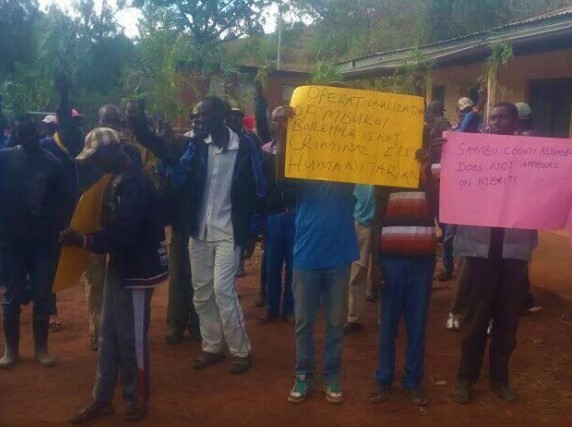
By Correspondent
Living in the reclusive and hidden part of Mt Kenya forest at Gitogoto village in Meru County, is an adventurous experience for visitors-and natives alike.
Tucked in the middle of two rivers and surrounded by a forest of mostly indigenous trees, locals aver it is a nice place to live in, as it offers the peace and tranquility, two recipes for a good life.
What with the village nestling in the quiet of Mt Kenya forest, and the crucial river Thuci flowing near their homes, farms, schools, shops and other.
The older men from Gitogoto love to tell tales of how they made journeys through the forest and across the rivers to Tharaka Nithi and even Embu counties, ostensibly to look for girls, their future wives.
The Thuci marks the border of the larger Meru and Embu counties, and men from Gitogoto said they married from different clans in the neighbouring counties.
The men say though Gitogoto remains shut to the outside world because of its inaccessibility they are happy because it is the ideal place to live a simple life-and farm.
But there is always a danger posed by wild animals lurking in the forest.
“But we mostly keep away from the forest so we do not bother the animals. They also do not bother us. Of course some women are brave enough to venture on the periphery of the forest in search of firewood, but we have had no major incidents of animal attacks, especially because there is an electric fence diving us,” said an elder.
But for those daring enough, it can be adventurous to venture into the forest, where the cool breeze massages your body, amid the melodious, soothing chirping of the birds, below low-hanging clouds nuzzling the trees.
Here, the cool air, swaying tree branches and the chirping have conspired to offer the perfect serenity, where one able is incredibly able to surrender themselves to the embrace of nature.At Gitogoto you will find a people at peace with themselves and nature, and seem to be protected to the vagaries of nature and the outside world. The residents who are part of Karingani on the fringes of Chuka town, have their own unique language which is markedly different from the original language, as effects of inter-marriage with Embu and Merus mixed.
The original language has morphed as the inter-marriage between people of different cultures of the three counties came together, and resulted in a unique blend of dialect.
“Over 90 percent of women married in Gitogoto are from Embu. Only those who were born by 1966 and thereabout had luck to get wives from their own sub tribe before they migrated. We live Isolated compared to our Embu neighbors. When it rains, movement becomes a thorn in the flesh. We are confined here by Mt Kenya forest on the right and river Thuci,” said Josphat Gitari, a retired teacher.
The aging Gitari, who is chairman of Thuita and Magumoni Njuri Ncheke council, said they were flushed out of their land and were resettled in their present location.
He said they were forcibly evicted from their homes around the forest in 1938, the first forest line at Muutine which marked the actual border along the forest, joining Karingani, Magumoni, Mwimbi and Gitombani.
He termed the then Eastern region Provincial Commissioner, a white settler, ‘Nyang’au’ (Hyena) for the evictions.
He said the ideal thing would be to be given back their land, though he worried it could be a source of conflict in the community.
“Few people would remember where their original houses or farms were, so many years back. It would bring conflict, I think,” he told The Eastern.
“We don’t live in the forest. It lives within us. So many people would as well claim ownership. We have been fighting to reclaim our land back but it has been unfruitful,” he said.
He blamed his then area chief, identified as Mutua for welcoming the white man who disposed them of their land.
“The chief feared more people could be killed,” he said.
He said they were shocked to learn that the Embu chief he identified as Muruatetu was considerate and didn’t allow his people to vacate their farms.
“This is why you see they have penetrated the far end. Their people were allowed to live in their farms,” he added. Tharaka Nithi Governor Muthomi Njuki’s administration established a modern dispensary at Gitogoto, in the middle of the forest.
They also have a primary school, courtesy of Maara MP Kareke Mbiuki’s National Government-Constituency Development Fund. There is no shopping centre, but a few canteens with a thin menu exit.They travel kilometers to Kathageri in Embu especially on Sundays to buy food, clothes and other necessities
Lack of land forced them to practice subsistence farming, and they are seldom left with surplus to sell. Mobile phone network is a challenge too, and Nyaga said they wished the mobile telephony providers can install masts for easier communication.
Comment (1)
-
Very true.
Something must be done.




